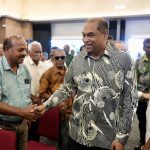Attributed to Melissa Norman, Founder and Managing Director, Aisling Consultancy.
Aisling Consultancy has described Budget 2026 as a necessary step towards building Malaysia’s future workforce, emphasising that talent infrastructure must remain central to the country’s high-value economic ambitions.
Founder and Managing Director Melissa Norman said the RM470 billion Budget, which targets a 3.5% fiscal deficit and maintains nearly RM100 billion in development spending, reflects a strong commitment to structural reform and long-term competitiveness.

“The measures announced provide a clear direction for Malaysia’s transition into a high-value economy. However, sustainable progress depends on how effectively we invest in people, not only in infrastructure or technology,” she said.
Melissa highlighted the RM7.9 billion allocation for Technical and Vocational Education and Training (TVET), the highest in Malaysia’s history as a critical opportunity to align education outcomes with industry demand. She said the move to unify TVET governance under a single coordinating framework can help reduce duplication, strengthen collaboration and produce measurable results across sectors.
“TVET reform is one of the clearest signals in this Budget that Malaysia recognises the importance of workforce capability. What matters now is execution, ensuring that each ringgit spent leads to tangible outcomes such as employability, wage mobility and productivity growth,” she said.
Melissa added that Malaysia’s broader ambition to lead the region’s high-value economy through strategic investment and regional integration can only be realised if the workforce is equipped to support advanced industries such as digital technology, green manufacturing and renewable energy.
“Today’s workforce increasingly looks for learning & development growth as a natural part of their work experience. Leaders need to integrate continuous training to promote on-the-go development. This helps to create space for employee exploration to foster collaboration, innovation and build competency through practical, hands-on learning,” says Melissa.
The budget’s strong emphasis on artificial intelligence (AI) and digitalisation including initiatives such as Microsoft’s RM10 billion investments to train 800,000 Malaysians under the “AI for Malaysia’s Future” programme and tax incentives for AI and cybersecurity upskilling reinforces the government’s recognition that digital talent is the foundation of future competitiveness.
“Aisling supports these measures and views them as complementary to Malaysia’s broader
talent infrastructure agenda. Human centred capabilities such as creativity and emotional intelligence will remain as primary drivers of how AI is applied. Cross-generational learning opportunities will promote a more holistic adoption to enable adaptability into the employee work life cycle,” she added.
Aisling also stressed the importance of accountability in workforce development, recommending the establishment of a national human-capital dashboard to track key metrics such as employment quality, skills utilisation, and wage progression. Such transparency, Melissa said, would enable policymakers and employers to make evidence-based decisions and ensure that training investments deliver measurable value.
The consultancy welcomed the Budget’s inclusive focus, noting that equitable access to upskilling opportunities for rural communities, gig workers, women returning to work, and mid-career professionals remains essential to long-term resilience.
Melissa emphasised that the private sector must complement government initiatives by treating talent development as a strategic investment, not a compliance cost. To support, Aisling continues to work with employers to design and implement workforce transformation frameworks that link skill-building directly to productivity and business outcomes.
“Malaysia’s progress will depend on how well public and private sectors collaborate to turn around fiscal plans and skill growth to become an engine of broad-based prosperity for Malaysia. Budget 2026 provides the right foundation and now the focus must be on disciplined execution and measurable results,” she said.
Aisling reiterated its commitment to partner with ministries, education providers, and employers to strengthen Malaysia’s human-capital ecosystem, noting that the nation’s competitiveness will ultimately be defined by the quality and adaptability of its people.
“Talent is Malaysia’s most valuable infrastructure. When we invest strategically in people, we secure the foundation for long-term growth,” Melissa concluded.










